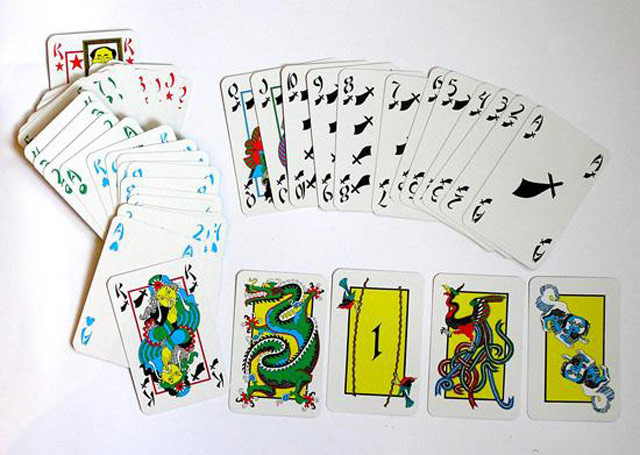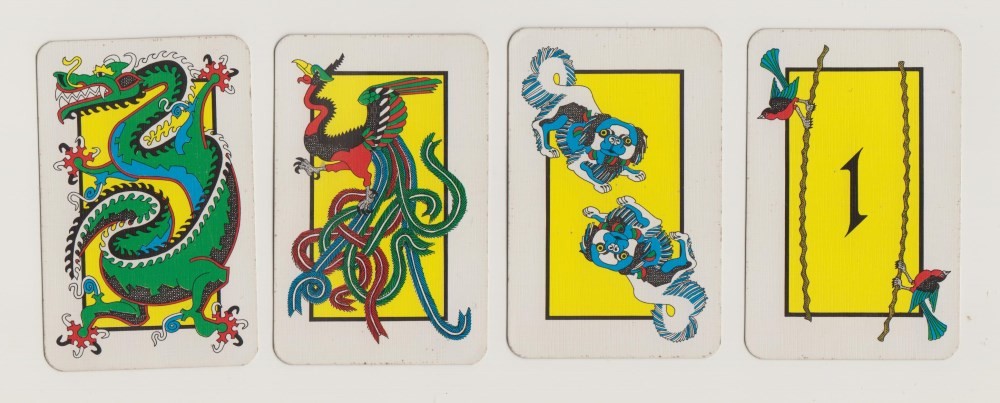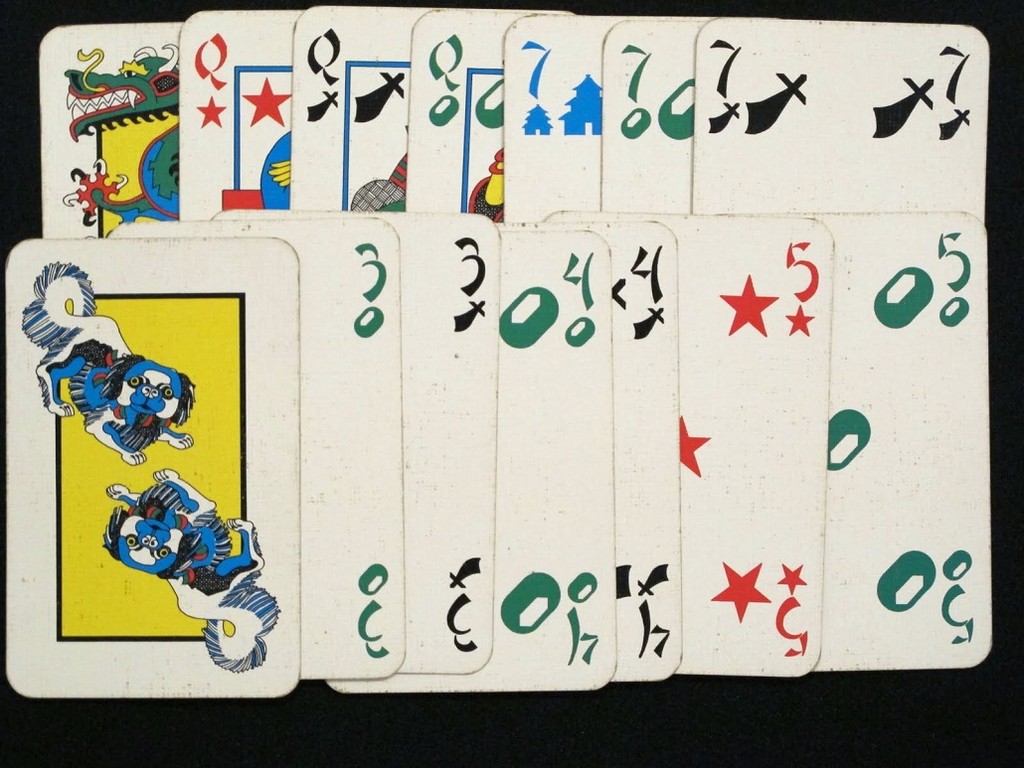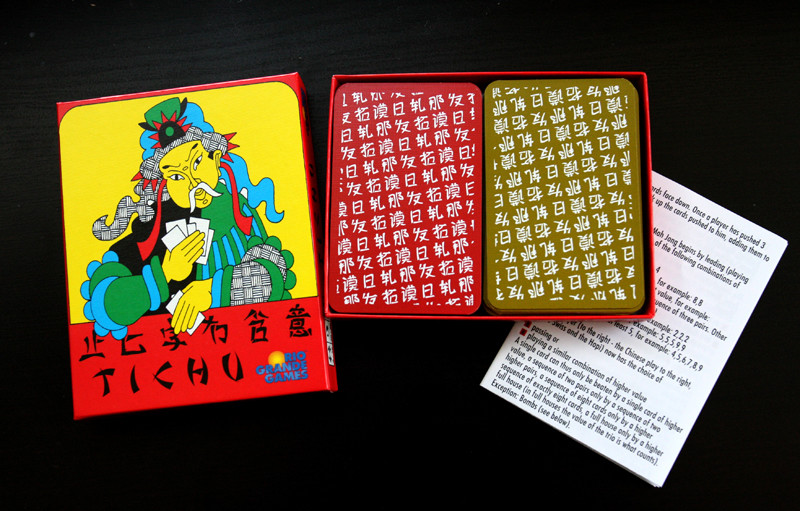Amazing game tichu
Tichu is a game played with a deck of cards. It is actually a board game that includes elements of Bridge, Dai Hin Min and poker. It is a game that can be played in different variations and the most famous are Tichu (that can be played by four people), Threetsu (that can be played by three people) and Tientsin (that can be played by six people).
In Greece, this game is very popular to students, and it is like an unwritten law that "If you are a student and you don't know how to play Tichu, you are not a real student! ".
There are even tournaments that are being organized among lots of cafeterias, that have prizes for the winner teams and these tournaments attract many many people every time they are being organized.

Gameplay
The four players for simple Tichu create two teams and the players are sitting between the two opponents and across from the teammate. Traditionally, the movement of the game is counter clockwise but is usually played clockwise.
The game is played with a deck of 56 cards. Additionally to the classic cards (2, 3, 4, 5, 6, 7, 8, 9, 10, J, Q, K, A), there are 4 more special cards (Mah Jong, Dog, Phoenix, Dragon). The regular 52 cards are divided into four categories based on their colors (Jade-the green cards, Sword-the black cards, Pagoda-the blue cards and Star-the red cards).
The cards are shared one by one to each player, starting with the one who sits on the right of the person who shares the cards. At first each player gets eight cards and at this stage he has the right to call “Grand Tichu”, which is a 200 point bet that means the person who called it believes that he will be the first to get rid of his cards. After everyone has decided if he will or won t call “Grand Tichu”, six more cards are dealt and players can no longer declare “Grand Tichu”. At this point and until a player plays his first card, he may call “Tichu”, which is a 100 point bet that he will be the first to get rid of his cards. The diefferences between “Grand Tichu” and “Tichu” are the number of cards you have seen and the number of the points that are involved.
Every player prepares three cards to exchange with the other players. Each player passes one card (face down) to each of the other players (one to each opponent and one to the partner). Players are not allowed to see the cards that have been given until everyone finish with their exchanges. The most common tactic is to give to the opponents as low cards as possible, while teammate takes a high card). Until all the exchanges are over, players have the right to change the cards that they have given if they want to. But if anyone lifts a card, no one can change a card that has given.
After everyone lifts the cards that they have been given, the game starts. First is the player who has the Mah Jong card. He can play the Mah Jong card alone or within a straight (m j, 2, 3, 4, 5). A player may pass on a trick with the option to play in later. A trick is completed if it is passed three times in a row.
Special cards
The Mah Jong
The player with the Mah Jong leads the opening trick. It is not required to play Mah Jong in the opening trick. The Mah Jong may be played as one either by itself or as a part of a straight. When the Mah Jong is being played you have the right to make a wish and request a card (from 2 to Ace) and the next player is obligated to throw that card, following the combination that has been played, if possible. The Mah Jong wish remains active until it is fulfilled. If the card that has been requested is part of a bomb, the player must throw the bomb. If the Mah Jong opens a trick as a straight, the next player must play a straight containing the wished value, if possible. If a straight can only be constructed with the Phoenix (as wild card, not the wished value), you must play it. But you do not have to play a straight with Phoenix as the wished value.
There is also this peculiarity. For example if player A requests with the Mah Jong a card that player B has to play, player B‘s teammate can protect player B by playing a bomb before player B plays. In that way the teammate of player B earns the turn and he can fulfill the Mah Jong wish by himself. This is a common tactic when one player declared “Grand Tichu” and the teammate understands that the Mah Jong wish destroys a strong combination of the cards of his partner who has called “Grand Tichu”.
The Dog
This is a card that has no numeric value and cannot be played in a trick. The Dog can only be played if won turn and passes the turn to your partner. If your partner is out, the Dod play passes to the active player after your teammate‘s position. The Dog is the only card that cannot be hit by a bomb.
The Phoenix
This card has X value and may be played alone as 0. 5 higher than the previous card played, or as a value card in a hand with a value from 2 to ace. Phoenix can create almost whatever combination that a card is missing (i. e. 234P67, 99P22, 77889P etc. ). If played by itself for example over a 3, then the next player may play a 4, because the value of Phoenix in this case is 3. 5. in a single play it has only value of 1. 5 when played as lead. Phoenix is a higher card than ace but smaller than Dragon. Phoenix cannot be included as a wild card in a bomb.
The Dragon
This card has X value and can only been played in a single card trick. Dragon is the strongest card in a single card trick unless it is bombed. If you win the trick with Dragon, the trick is given to your opponent. If the dragon is bombed, the player who played the largest bomb takes the entire streak.

The four special cards (from left to right): The dragon, the phoenix, dogs and The Mahjong.
Combinations
The combinations that can be played are:
- A single card (i. e. 2, 7, 9 etc. )
- Any pair (i. e. 5 5, 8 8, J J etc. )
- Two or more stairs (i. e. 223344, 77 88 99 10 10 etc. only sequentially pairs can be played)
- Three of a kind (i. e. 333, KKK etc. )
- Straights of at least five cards in length (i. e. 23456, 78910JQK etc. )
- Full house (i. e. 66655, QQQ77 etc. )
- Bomb: which is four of a kind or a straight flush of at least five cards (i. e. 2222, 4444 etc. ), (34567, 678910JQ etc. in the same color). The power of the bomb is defined by the number of cards and from the value of cards (i. e. 3333>5555>34567>10JQKA>456789).

Scoring
The total amount of points in Tichu without bet are 100, so the final total score of the two teams is always 100. The cards that count as points are 5 as 5 points, 10 as 10 points, K as 10 points, Dragon as 25 points and Phoenix as -25 points.
The “Grand Tichu” bet is 200 points. If the player who declared “Grand Tichu” wins, his team wins 200 points otherwise, if they lose, they are -200 points. The points that you get for betting “Tichu” are 100 and if you lose are -100.
If both players of a team get rid of their cards before their opponents, the winning team scores 200 points and there is no card scoring at this round.
The last player out gives their remaining cards to the opposing team, and gives all the tricks he has won this round to the first player out.
If both players of a team who betted “Grand Tichu” or “Tichu” and get rid of their cards first the points that they will get are 400 for “Grand Tichu” and 300 for “Tichu”.
Usually the game ends when one team reaches 1000 points. It is possible for a team to score negative points.
Common Strategies
Get rid of your low cards early in the game and keep bombs, Dragon, aces and Phoenix as much as possible. For example if after a bomb your cards are 2 and Dog, then it was probably not a sensible move.
Avoid to request with the Mah Jong if your teammate called “Grand Tichu” or “Tichu”. There is a great risk to ruin an excellent combination of cards or even a bomb of your partner.
If the opponent who plays after you has called “Grand Tichu” or “Tichu”, try to understand what he may have based on your cards. For example if you do not have a 5, it is possible that your opponent has at least one, so request a 5 with the Mah Jong.
If your opponent didn’t call “Grand Tichu” or “Tichu”, request the card that you gave him to be completely sure that you ruin a combination or a bomb that you may have created.
If your partner have called “Grand Tichu” or “Tichu”, you usually give a high card (ace, Dragon or Phoenix). If you have all of them it would be good to give the Dragon. Between Phoenix and ace prefer to give Phoenix.
Aces, Kings and Queens are high cards. If you have a bomb with high cards, and the bomb is requested, you will rarely have to play it as a bomb. Also, even though a bomb of aces exists it is a bad stategy to play it as a bomb unless you can win.
You are not allowed to ask for cards.
You usually give the Dog card to opponents unless your teammate or you have called “Grand Tichu” or “Tichu” that in the first case you keep the Dog card and in the second you give the card to your opponent. However if you have nice combinations of cards and you are sure you will not need help give the Dog to one of the opponents.
Try to avoid to place Phoenix at the start or at the end of a straight, unless you can get rid of your cards first.
Variations
Three player game or Threetsu
Threetsu is being played exactly like Tichu with the exception that there are three players instead of four. At Threetsu, the player who shares the cards (dealer), plays with an invisible teammate. Cards are dealt the same way as normal. The dealer controls his own cardsand the cards of the invisible teammate. The exchange of cards is normal, only the dealer and the invisible teammate cannot give each other a card. You cannot declare “Grand Tichu” at this version of Tichu. After the exchanges, the cards of the invisible teammate must lay face up on the table. After the round another player plays with the invisible teammate because playing with him has a slight advantage. Also, the invisible teammate can declare “Tichu” as well and he is not obligated to fulfill the Mah Jong wish.
Tientsin
Tientsin is played by six payers. The rules are almost the same with Tichu, and the main difference is that the teams are composed by three people instead of two.
You may declare “Grand Tichu” only after the first six cards are dealt.
The number of the cards is not the same for every player. Everyone gets 9 cards, except the people who stand at the right of the dealer that they will get an additional card.
You can only exchange cards with your teammates and not with your opponents.
The person who plays the Dog card, can choose one of his teammates to play. If his teammates are out, the person who plays is the one at the left of the person who played the Dog.
When one team gets rid of all its cards while all three opponents still hold cards, it is a triple victory and score 300 points.

It is a great game! You should give it a try with your friends. You will have a lot of fun.
Photo gallery
Content available in other languages
- Español: Tichu, un juego increíble
- Italiano: Tichu, un gioco sorprendente!
- Polski: Świetna gra Tichu
Want to have your own Erasmus blog?
If you are experiencing living abroad, you're an avid traveller or want to promote the city where you live... create your own blog and share your adventures!
I want to create my Erasmus blog! →







Comments (0 comments)